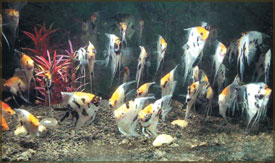|
DAILY NEWS ONLINE |
|
|
|
OTHER EDITIONS |
|
|
|
|
|
|
|
|
|
OTHER LINKS |
|
|
|
|
|
|
  |
'Paradise' fish farm from schoolboy dream
|
|
|
There are success stories of schoolboys pursuing their hobby as a means of livelihood in adult life. One such person is Anura Gunasekera who has set up the Paradise Aquarium in Yakkala.
Nearly all the permanent waters of the world, still or moving, salt or fresh are stocked with fishes, over 20,000 species of them. The greatest proliferation of species and the most exotic of them are found in the lakes and ponds, swamps, streams, rivers estuaries and coral areas of the tropics.
The majority of nature's beautiful creatures are seen at their best at liberty in their natural surroundings. In captivity - however well cared they may be - captivity takes the bloom from their beauty, constricts their vitality and compromises their dignity.
|
|
But fish being water creatures, not of our element are very difficult to see in their natural surroundings and often in any case show little of their colour there.
However they are small enough for it to be practicable for us to recreate their homes within our own - to make a miniature underwater world, a complete ecological system with animals, plants and materials in a balanced relationship.
There is no smell, no mess, no prohibitive expenses and infinite possibilities for imagination and creativity for breeding and exhibiting and photography. This is Aqua-culture.
Anura's story
As a young school boy studying at the Gampaha Bandaranaike Vidyalaya Anura started working at his hobby with just two kinds of common fish - Guppies and Platies.
After passing the Advanced Level Examination in the Science stream, Anura was faced with the prospect of finding suitable employment, as is the problem with today's youth. His mind dwelt on his childhood hobby, which he thought he would pursue.
He made up a small aquarium in his home garden where he started breeding and rearing several species of ornamental fish which included Guppies, Platies and Sword-tails.
Many of his earlier clients were the children in the neighbourhood. Later on as his stocks increased he started supplying fish to other sales outlets.
His life took a new turn when the government decided to assist those engaged in ornamental fish farming in the Mahaveli project's Maduru Oya areas of Polonnaruwa. Large ponds were dug which very often had natural water supplies.
Anura went on to lease several of these ponds and engaged farmers in fish breeding activities having instructed them in feeding and caring of fish.
The fish species - Gold Fish, Angels, Carps, Goggle-eyeds etc. that he introduced to these ponds were normally fed with finely ground raw rice remaining after pounding. One such farm is located in Arunapura in Polonnaruwa.
Anura's fish breeding farms have become lucrative business to him and those farmers who assist him. Anura thus gets the distinction of being the second person to successfully undertake Ornamental Fish breeding in Polonnaruwa.
Aquariums
Aquariums have become excellent attractive focal points in home decor. There is a saying that watching fish in a little aquarium at home is a method of relaxing tired minds and those prone to other heart ailments.
In this context it is noted that some species have been seriously depleted by over-fishing to supply the hobby but others threatened by pollution or destruction of habitat are safe from extinction, because of larger breeding stocks held in captivity.
This applies only to fresh-water fish species. The writer was told that Marine tropicals cannot yet be bred in captivity.
However, Environmentalists say that whilst promoting Aqua-culture as a commercial enterprise with job opportunities, in the interests of conservation the present uncontrolled pillaging of reefs for corals and shells and living marine specimens should be discouraged.
|
|


